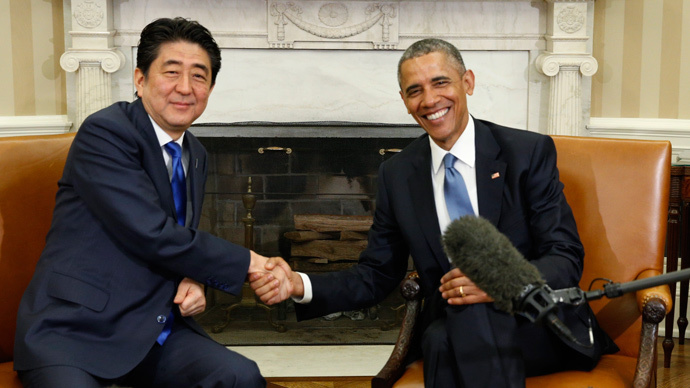‘US military rhetoric is really aimed at Beijing’

The underlying context of the US-Japan security deal is not the always-convenient excuse North Korea, but China’s increasing military expenditure and army capability, James Corbett, editor of The Corbett Report, told RT.
RT:Japan has been at loggerheads with China for quite a while. How could Beijing react to the expansion of Tokyo's military power?
James Corbett: I haven’t heard of an official reaction from Beijing yet, but I think we will probably see one coming out through the Chinese Communist Party news, media organs, in the near future. There is no choice for Beijing at this point to respond to this in any other way than with consternation at the obvious expansion of US/Japanese militarism in the region. This is an obvious step towards increasing those tensions that we saw. Some amount of diffusion over the last couple of years, but this is going to ratchet it right back up to that point of tension that we saw a few years ago in the East China Sea.
RT:The US says it's prepared to use its nuclear arsenal to defend Japan. Who's this kind of rhetoric aimed at?
JC: North Korea is always a convenient excuse for that type of rhetoric as North Korea continues to threaten Japan, the US, and various other nations. So there is always that security concern which can be used. But everyone in the region understands that that rhetoric is really aimed at Beijing, however it is being cloaked as China is obviously increasing its military expenditure; it is increasing its power and capability of the PLA Navy [People's Liberation Army] and army. That is the real underlying context of this security deal and why it is being hammered out at such rapidity right now.
READ MORE: US & Japan unveil new defense policy amid China tensions
RT:How much of a danger does China pose to Japan at the moment?
JC: Potentially it’s a growing danger. It’s still not capable of taking on the US military which is why I think the reaffirmation of complete US support for Japan including its claims to the Senkaku Islands in the East China Sea is so significant because with the US military support Japan is still not really threatened fundamentally by China. But it is starting to change as we see the development of more sophisticated weaponry on the Chinese side. So I think this reaffirmation is actually quite significant from that perspective and that’s why I think Beijing is going to feel directly threatened by that.
RT:What about the Japanese public, are things changing for the people?
JC: There has been something of a shift here in recent years. So at the very least it’s becoming more politically and socially acceptable to espouse more nationalist and militarist sentiment, and that is something that is being fostered in various online communities etc. Japan generally likes to see itself as a pacifist nation but that is being changed slowly but surely. And this is just one sign of a number of worrying signs for a lot of the Japanese public from the Abe government, including a recent crackdown on the news media and what they are able to report that led to one reporter quitting live on air with big protest about Abe and the direction its government is going.
MORE:
The statements, views and opinions expressed in this column are solely those of the author and do not necessarily represent those of RT.
The statements, views and opinions expressed in this column are solely those of the author and do not necessarily represent those of RT.












